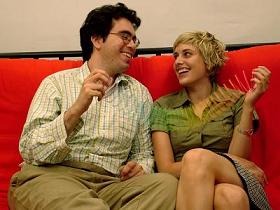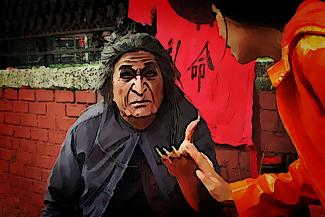After an email exchange with a friend in which I stated the following:
> i saw the queen and marie antoinette as well–enjoyed the queen, and i admired sofia’s intentions in antoinette but didn’t think it really came to fruition–i understand that she wanted to show her to be completely isolated and oblivious but the way she did it i felt it amounted to little more than a statement that it’s great fun to be rich and why do the dirty plebes have to ruin our fun? i thought the queen did a much better job of showing an equally oblivious character because we also got to see what all the fuss was about among the commoners. just because a character is oblivious doesn’t mean the film should be, in my opinion, and sofia’s is. i honestly don’t think she has it in her to criticize the rich, at least not yet.
he then forwarded to me a review of the film by David Mendelsohn, saying that he seemed to share my opinion. And indeed, I loved it so much I must quote and link it. He says much more elegantly and forgivingly what I said so angrily. Sorry for the length of the quotes but it’s just so good I couldn’t cut it.
First, on her slapdash inclusion of historical events:
One of the two great problems of the film is the sense you often get that she’d done her homework rather too faithfully: the languid freshness and visual originality of many scenes that seem evocative of Marie Antoinette’s inner life stand in vivid contrast to the impression often given, as in so many film biographies, that the narrative is ticking off the big moments in the well-known life.
Here Coppola’s film falls apart, because her special gift is for conveying emotional and psychological states suggestively, allusively, and impressionistically, by means of collocations of images; she has less talent for telling a straightforward tale. The movie suffers when you feel, as you often do, that she’s read Fraser’s biography thoroughly and is dutifully reproducing incidents of her subject’s life. Do we really need the story, which Fraser tells in great detail and which Coppola obligingly includes here, of how the dying Louis XV was forced to send away his mistress, Mme du Barry, in order to receive communion on his deathbed? The episode, hastily sketched in and, I suspect, incomprehensible to anyone unfamiliar with the sorry story of the awful death of the Bien-aimé, adds absolutely nothing to our understanding of the film’s subject, and ends by being a confusing distraction.
So too many of the episodes taken from the latter parts of Antoinette’s life—which is to say, the part of her life that took place after the crisis that is of real interest to Coppola, which is the crisis of a young girl torn from her natural setting and forced to stay afloat, willy-nilly, in a strange and foreign place. Coppola’s apparent lack of interest in anything outside of the cocooned and photogenic private world of the doomed Queen is evident in the desultory quality of the many stilted moments designed to convey what’s going on in the world beyond Versailles—the kind of clanking scene in which someone says to the King at a meeting of his council, “The Americans are asking for help with their revolution,” or, worse, when we see someone rush up to the King and announce, “The Bastille has been stormed!”
The director tries to cover over her slapdash approach to history with some familiar technical tricks (there’s a little montage in which we see some portraits of the Queen bearing scribbled labels that say things like “Madame Deficit,” and so forth), but it seems an afterthought. Such moments are mere chron- ological signposts, and the film loses its appeal whenever we are forced to rush by them. Marie Antoinette would have succeeded better purely on formal terms if it had never attempted to include this material—if it had been what I suspect Coppola always wanted it to be, a reverie on what it might have been like to be the very young Marie Antoinette, rather than a straight account of her life. In the end, it’s too little of either.
And on Sofia’s own Marie Antoinette-ish obliviousness:
But then—and this is the second and fatal problem with Coppola’s movie— could you, should you really make a film about Marie Antoinette the victimized young woman as if she were the private person she apparently wished, at times, she’d been? There is something Marie Antoinette-ish about the director’s impatient disdain for the outside world, for the history that was going on all around her sensitive and troubled heroine. (And not just around her, but right in front of her: when the Estates General finally met in May 1789, it was at Versailles—the first great intrusion of the coming Revolution into that enclave—although you’d never guess as much from this movie.)
There’s nothing wrong with being interested in the inner life of a queen who was, in the end quite tragically, nothing more than the “average woman” to which the subtitle of Stefan Zweig’s 1932 biography alludes,[2] placed by fate in extraordinary circumstances. But this particular life, the rather ordinary personality whose contours Coppola is interested in delineating here—and which she does delineate so effectively at times—had an enormous impact on history, on real events and persons. That this was already clear to the Queen’s contemporaries is evident from the concerns about the young queen’s behavior expressed by Joseph—no slouch himself when it came to hectoring letters—which are, in hindsight, particularly significant. “In very truth I tremble for your happiness,” he wrote his sister, “seeing that in the long run things cannot go on like this…the revolution will be a cruel one, and perhaps of your own making.”
The provocative relationship between personality and history in the case of Marie Antoinette has indeed been clear to subsequent generations. Writing thirty years after the Revolution, the comtesse de La Tour du Pin, by then a fifty-year-old émigrée, who had been presented at court as a young woman and whose glamorous mother had been a lady-in-waiting to the Queen (“the queen liked my mother, she was always captivated by glitter and my mother was very much the rage”), ruminated on the inevitable lessons to be gleaned from the Queen’s life:
My earliest visit to Versailles was in 1781, when the first Dauphin was born. In later years, when listening to tales of Queen Marie-Antoinette’s sufferings and shame, my mind often went back to those days of her triumph. I was taken to watch the ball given for her by the Gardes du Corps in the Grande Salle de Spectacle at Versailles. She opened the ball with a young guardsman, wearing a blue dress strewn with sapphires and diamonds. She was young, beautiful and adored by all; she had just given France a Dauphin and it would have seemed to her inconceivable that the brilliant career on which she was launched could ever suffer a reverse. Yet she was already close to the abyss. The contrast provides much cause for reflection![3]
But the contrast has apparently provoked no such reflection in Coppola, who in her new film gives you, as it were, the dress but not the abyss. To be so unreflective, to want to make a film about Marie Antoinette that ignores who she was in history, seems shockingly naive, intellectually. It’s like wanting to make a film about what it’s like to be a starving artist and deciding to have your hero be the young Adolf Hitler.
And so Coppola’s movie, which works so hard and with such imagination to include in its portrait much that has been ignored, ends up leaving out much that cannot be ignored. Most egregiously, it fails completely to convey in any way why it was that this particular queen aroused the loathing of many in her country. You get absolutely no sense from this film of the immense hatred that was felt for the Queen as the years went by, as she was languishing in her unstructured muslin lévites among the soft pillows of the Petit Trianon, to which Coppola’s swooning camera gives an almost erotic allure. The irony is that this willed ignorance of the larger world disserves Coppola’s artistic and emotional purpose. If the director had gone into all this, she’d have only underscored some of her subject’s sympathetic qualities; for there’s little question that while she could make gross mistakes of judgment, nearly all of the calumnies heaped on Marie Antoinette, including the notorious Affair of the Diamond Necklace, were absurd and vicious misrepresentations, when not downright inventions.
The result of all this is a film that is ultimately, like its subject, horribly, fatally truncated. Stefan Zweig, a far more tart and critical biographer than Antonia Fraser, wrote of the Queen that “though but little inclined to reflection, she was quick of perception, her tendency being to judge all that happened in accordance with her immediate personal impressions—for she saw only the surface of things.” It would be unfair to say that Sofia Coppola sees only the surface of things— she sees a great deal more, sees what surfaces can be the reflections of, and renders what she sees with artful ingenuity—but in this film, at least, it’s as if she’s been so bewitched by the fabulous beauties of the world she has chosen to depict, the silks and satins and shoes and frosting on the bonbons everyone always seems to be eating, that she’s lost track of crucial events and the inescapable larger meaning of her subject’s life. It seemed significant to me that this movie ends on the day the royal family leaves Versailles for the last time, prisoners of the Revolution—as if Coppola couldn’t bring herself to imagine where it was that all of the indulgence, all of the escapism, that she’s so artfully presented led to in the end.
The final silent image in this movie, so filled as it is with striking and suggestive images, tells you more about Coppola, and perhaps our own historical moment, than it could possibly tell you about Marie Antoinette. It’s a mournful shot of the Queen’s state bedchamber at Versailles, ransacked by the revolutionary mob the night before the Queen and her family were forced to leave, its glittering chandeliers askew, its exquisite boiseries cracked and mangled. You’d never guess from this that men’s lives—those of the Queen’s guards—were also destroyed in that violence; their severed heads, stuck on pikes, were gleefully paraded before the procession bearing the royal family to Paris. But Coppola forlornly catalogs only the ruined bric-a-brac. As with the teenaged girls for whom she has such sympathy, her worst imagination of disaster, it would seem, is a messy bedroom.
 Filed by cynthia rockwell at 12:47 pm under Just Movies
Filed by cynthia rockwell at 12:47 pm under Just Movies 3 Comments
3 Comments Which is why I am having trouble saying that the film left me a bit underwhelmed. I haven’t quite placed my finger on why, but it might have something to do with the tiny groan I emitted when, after the screening of the film, Swanberg said that it only took a few minutes of meeting his lead actress, Greta Gerwig, to know she could carry a movie. It seemed a particularly male comment to make–not simply because she’s quite fetching, but because her charms are the kind that really only work on men. I have very much liked all of Swanberg’s films, but I like Hannah less so, primarily because I found the actress so irritating.
Which is why I am having trouble saying that the film left me a bit underwhelmed. I haven’t quite placed my finger on why, but it might have something to do with the tiny groan I emitted when, after the screening of the film, Swanberg said that it only took a few minutes of meeting his lead actress, Greta Gerwig, to know she could carry a movie. It seemed a particularly male comment to make–not simply because she’s quite fetching, but because her charms are the kind that really only work on men. I have very much liked all of Swanberg’s films, but I like Hannah less so, primarily because I found the actress so irritating. These questions were fresh in my mind when watching Year of the Fish, a sort of fairy tale set among Chinese immigrants in New York’s Chinatown. In fact, the film is based on what is said to be the oldest known version of the Cinderella story, the ancient Chinese fable of Ye Xian. Shy new arrival Ye Xian lands in Chinatown expecting to work in a beauty salon to pay off her travel costs, only to find out that the salon in question specializes in “massage”, not beauty, and the evil shop madam and her bitter masseurs (step-daughters) hold her hostage to pay off her debts. After refusing to do massage, she is forced to scrub floors and toilets and cook for the “family” of prostitutes. There is a dashing prince (an American-born Chinese musician), a royal ball (Chinese New Year Party), and a fairy godmother (fortune-telling sweatshop-owning old chinese woman). It’s a clever premise, and I very much enjoyed the setting, one we rarely get to see close up in film, from the point of view of characters who actually live there rather than just visit for a drug deal and start shooting things and beating people up and crashing cars into wonton carts. I did ask the director why he didn’t shoot the film in Chinese, which would have added to the effect, but it’s understandable that he had certain constraints and this is after all a fairy tale–gritty realism is not a requirement. Then again, the massage-parlor storyline gets pretty graphic in places, and the grit of the Chinatown streets is certainly on full display, so it seems that if you open the door to this kind of mixture of reality and fantasy it’s fair to hope for the full effect.
These questions were fresh in my mind when watching Year of the Fish, a sort of fairy tale set among Chinese immigrants in New York’s Chinatown. In fact, the film is based on what is said to be the oldest known version of the Cinderella story, the ancient Chinese fable of Ye Xian. Shy new arrival Ye Xian lands in Chinatown expecting to work in a beauty salon to pay off her travel costs, only to find out that the salon in question specializes in “massage”, not beauty, and the evil shop madam and her bitter masseurs (step-daughters) hold her hostage to pay off her debts. After refusing to do massage, she is forced to scrub floors and toilets and cook for the “family” of prostitutes. There is a dashing prince (an American-born Chinese musician), a royal ball (Chinese New Year Party), and a fairy godmother (fortune-telling sweatshop-owning old chinese woman). It’s a clever premise, and I very much enjoyed the setting, one we rarely get to see close up in film, from the point of view of characters who actually live there rather than just visit for a drug deal and start shooting things and beating people up and crashing cars into wonton carts. I did ask the director why he didn’t shoot the film in Chinese, which would have added to the effect, but it’s understandable that he had certain constraints and this is after all a fairy tale–gritty realism is not a requirement. Then again, the massage-parlor storyline gets pretty graphic in places, and the grit of the Chinatown streets is certainly on full display, so it seems that if you open the door to this kind of mixture of reality and fantasy it’s fair to hope for the full effect.


 “Against the backdrop of a deserted resort town, three otherwise unconnected people—a chambermaid, a photographer, and a government official—meet to re-enact murders. But these documented re-enactments have nothing to do with crime-solving or for that matter any other discernable productive purpose; rather, the three appear to perform out of a perversely pleasurable fascination with death and with male-female power dynamics. They work with few props, but the government man, who provides the “scripts,” insists on such detailed blocking that their movements are mechanical, slow, awkward, and unprofessional. What emerges from this strange relationship is a meditation on despair, restlessness, and a disturbing attachment to prescribed roles.”
“Against the backdrop of a deserted resort town, three otherwise unconnected people—a chambermaid, a photographer, and a government official—meet to re-enact murders. But these documented re-enactments have nothing to do with crime-solving or for that matter any other discernable productive purpose; rather, the three appear to perform out of a perversely pleasurable fascination with death and with male-female power dynamics. They work with few props, but the government man, who provides the “scripts,” insists on such detailed blocking that their movements are mechanical, slow, awkward, and unprofessional. What emerges from this strange relationship is a meditation on despair, restlessness, and a disturbing attachment to prescribed roles.” The Good Times Kid. “What would you do if you met yourself? Rodolfo Cano (Azazel Jacobs) and Rodolfo Cano (Gerardo Naranjo), by chance, cross paths. But there is more to these men in common than just their names. Both Rodolfos flounder through life, barely getting involved and want to step back even further. Rodolfo is exasperated with his girlfriend, Diaz (Sara Diaz), and walks out on her. Rodolfo walks in on her. These multiple chance meetings have created the most magical night for any of them and as the night flows on and on, each character’s secrets slowly rise to the surface. As the sun starts the next day, we finally see who each character really is.”
The Good Times Kid. “What would you do if you met yourself? Rodolfo Cano (Azazel Jacobs) and Rodolfo Cano (Gerardo Naranjo), by chance, cross paths. But there is more to these men in common than just their names. Both Rodolfos flounder through life, barely getting involved and want to step back even further. Rodolfo is exasperated with his girlfriend, Diaz (Sara Diaz), and walks out on her. Rodolfo walks in on her. These multiple chance meetings have created the most magical night for any of them and as the night flows on and on, each character’s secrets slowly rise to the surface. As the sun starts the next day, we finally see who each character really is.” Gretchen. “Wildly expressionistic and deeply strange, this expansion of Steve Collins’ SXSW prize-winning short film GRETCHEN AND THE NIGHT DANGER follows Courtney Davis’ titular foot-clomping high-school casualty, adrift in ugly sweaters and laugh-out-loud pig-tail holders, and still always undone by her misguided love for bad boys. Stringy-longhaired chain-smoking Ricky hasn’t been treating Gretchen right, which – for reasons it is probably best not to get into here – leads to our heroine spending a fair amount of time at the Shady Acres Center for Emotional Growth. … an eerie echo of a recently bad affair sends Gretchen on the road to track down her long lost father (News Radio genius and Texas indie film hero Stephen Root). The results of this reconciliation are both heartbreaking and darkly hilarious, as Collins finds a way to convey the awkward outsider ethos that appreciates and accepts his main character’s pathos without ever devolving into NAPOLEON DYNAMITE-styled mockery.”
Gretchen. “Wildly expressionistic and deeply strange, this expansion of Steve Collins’ SXSW prize-winning short film GRETCHEN AND THE NIGHT DANGER follows Courtney Davis’ titular foot-clomping high-school casualty, adrift in ugly sweaters and laugh-out-loud pig-tail holders, and still always undone by her misguided love for bad boys. Stringy-longhaired chain-smoking Ricky hasn’t been treating Gretchen right, which – for reasons it is probably best not to get into here – leads to our heroine spending a fair amount of time at the Shady Acres Center for Emotional Growth. … an eerie echo of a recently bad affair sends Gretchen on the road to track down her long lost father (News Radio genius and Texas indie film hero Stephen Root). The results of this reconciliation are both heartbreaking and darkly hilarious, as Collins finds a way to convey the awkward outsider ethos that appreciates and accepts his main character’s pathos without ever devolving into NAPOLEON DYNAMITE-styled mockery.” Hanna Takes the Stairs. I really liked Joe Swanberg’s
Hanna Takes the Stairs. I really liked Joe Swanberg’s  Congorama. A Belgian finds out he was born in Canada and travels there to find his biological parents, but “all he finds in the Canadian countryside is bad fries and bad beer.” I look forward to someone making a movie that slams Canada for a change. Move over America, there’s a new asshole on the map!
Congorama. A Belgian finds out he was born in Canada and travels there to find his biological parents, but “all he finds in the Canadian countryside is bad fries and bad beer.” I look forward to someone making a movie that slams Canada for a change. Move over America, there’s a new asshole on the map! Day Night Day Night. The description of this film sounds very
Day Night Day Night. The description of this film sounds very  Year of the Fish. And indie film fest usually specializes in films that are trying hard to be ‘quirky’. It can get to be annoying because all the films start to seem the same. But this one just sounds loopy enough to be interesting: “A modern-day Cinderella travels to New York’s Chinatown to earn to money help her father. Before she knows it, she’s working as a servant for an evil massage parlor madam. Her only companion is a fish that acts as narrator to our trip through this painted fairy tale.”
Year of the Fish. And indie film fest usually specializes in films that are trying hard to be ‘quirky’. It can get to be annoying because all the films start to seem the same. But this one just sounds loopy enough to be interesting: “A modern-day Cinderella travels to New York’s Chinatown to earn to money help her father. Before she knows it, she’s working as a servant for an evil massage parlor madam. Her only companion is a fish that acts as narrator to our trip through this painted fairy tale.”

 Great
Great 

